Types of varnish for acrylic paint
The million dollar question is… Now, what varnish should I use to protect the stones that I have painted?
Today we bring you this article to get you out of the typical doubts that so many people have asked us and that we also had to protect this type of crafts.
Therefore, We show you a series of tests and results that we have done to describe the characteristics, advantages and disadvantages of each type of varnish. In this way you can decide more easily which varnish to use, depending on which one you like the most or the best for you. Let’s go there!
Acrylic spray varnish
This type of varnish is ideal for small stones with many details. We recommend it for those more delicate and complicated DIY to apply with a brush. Above all, it is ideal for paintings and crafts made with a marker. It takes between 15 and 20 minutes to dry.
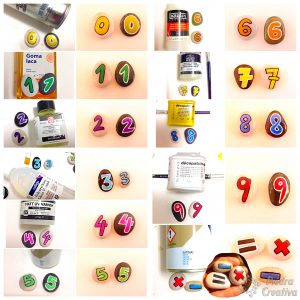
Gloss (image No. 0), Satin (image with +, – , = ) Matte (image No. 5)
Easy to find. Dries very fast. The finish is perfect and uniform.
Its cost is high because the spray is spent fast. It is toxic, NOT recommended for use with children. It is advisable to use a mask and apply it outdoors.
Acrylic common varnish (for Stone)
It is the most commonly used varnish for different types of tasks. With a thick texture, it takes about 2 hours for the 1st layer to dry and 12 hours for the 2nd layer.
Easy to find at any DIY store, very economical. It is resistant to the outside.
It is toxic, NOT recommended for children. Cleaning with solvent.
Vitrifier Varnish
It is a varnish for almost all types of crafts, especially for Decoupage. Of thick texture and aqueous composition. Drying time 1 hour for the 1st layer and 2 hours for the 2nd.
Washable with water. Highly recommended for use with children. It is not toxic.
It is expensive, it is not recommended for outdoor. Not recommended with a marker, it is possible that it diffuses and spoils the craft.
Polyurethane varnish
This varnish has a thick texture with polyurethane composition and easy cleaning. Approximate drying time of 4 hours between each layer.
It’s not toxic, it is very resistant, it is cheap and recommended for use with children.
It is not recommended to apply it on stones painted with markers, since it can blur the drawing.
High Gloss Varnish
This permanent varnish is used in fine arts and to protect surfaces. It has a liquid texture and a drying time of 3 hours.
Gloss (image No. 6)
It is not toxic. For indoor and outdoor use. It’s resistant to wáter.
Too much liquid for stones and for use with children. Cleaning with solvent. It is expensive.
UV Varnish
Liquid varnish resistant to ultraviolet rays. Used for paintings with acrylic paints.
Satin (image No. 7) and Matte (image No. 4)
Resistant to the passage of time.
It’s toxic. Not suitable for children. It is removed with solvents. It takes 24 hours to dry the 1st hand, and 48 hours the 2nd. It’s expensive.
Gum Varnish
It is used for wood as a primer, but it works very well on the stone. For indoor use. Create a layer that smoothes the Surface.
Drying very fast, between 15 and 20 minutes to apply a 2nd coat. Its finish is uniform. It can also be used on markers.
Toxic. It is removed with alcohol. Not recommended for use with children. It’s expensive.
Dammar
It is a varnish that is used in fine arts to protect paintings in paintings. Made with resins. The finish is very bright and is very smooth. While it dries, it is sticky.
Very good smooth finish. Resistant to the passage of time and weather conditions.
Very very toxic, NOT suitable for children. Beware of exposing outside the stones to children and animals, because, due to its toxicity, it is not recommended. It takes a long time to dry, between 24 hours to add 2nd layer and up to 3 days for a third. It is removed with solvent. It’s expensive.
Very important: Read the instructions before using this type of product. The use of varnish and paint can be harmful to your health and that of children if proper precautions and indications are not followed.
These are the varnishes that we have tried and our experience with them. There are a great many types and brands, so the characteristics can be different in each case. If you find one that you like more, for its finish, resistance, durability, etc. or have any suggestions, tell us. We will be happy to expand the knowledge and experience of all people who like this type of art.
EXTRA: Do you want to make a better decision about what varnish to use?
Subscribe to our newsletter and you will receive exclusive details of the varnishes used with a comparative table.
With these tips, we want to help you choose the best type of varnish to make your creations even more spectacular.
[yasr_visitor_votes size="large"]A huge kiss and enjoy learning with PiedraCreativa


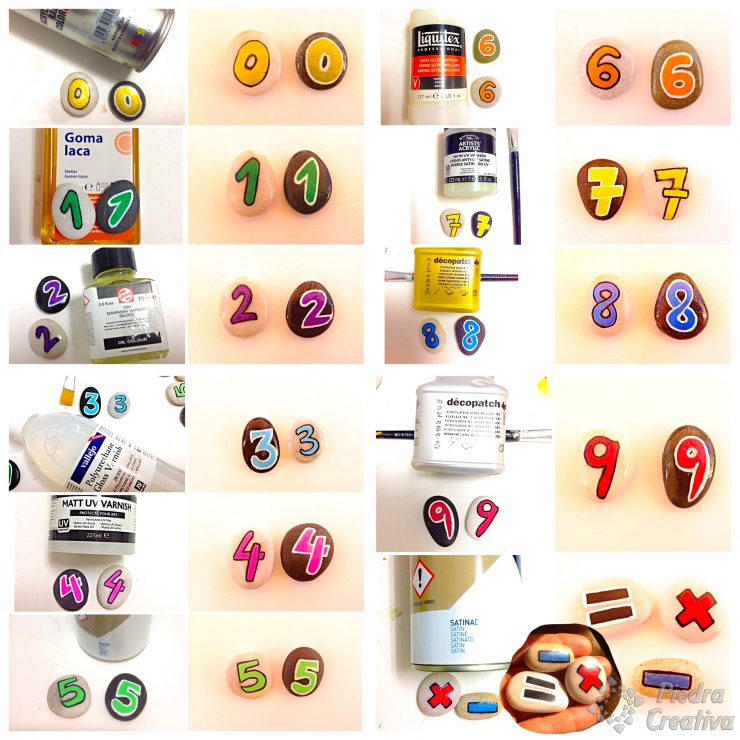
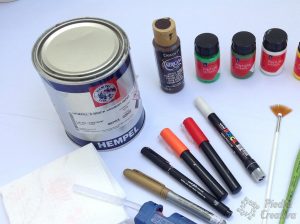
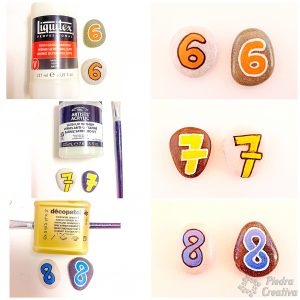
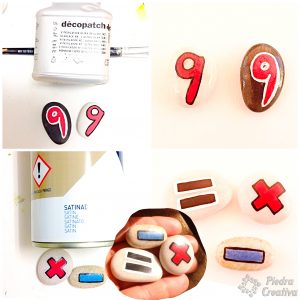
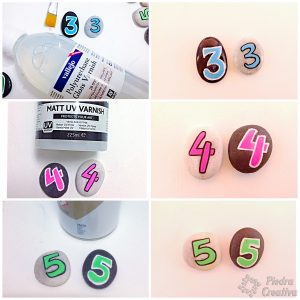
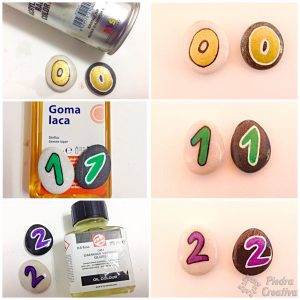
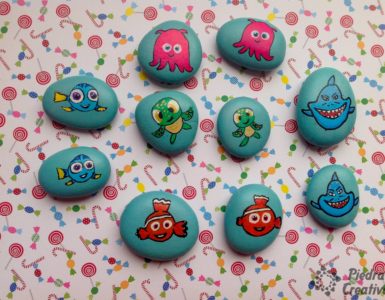
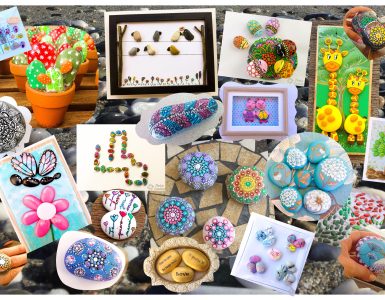
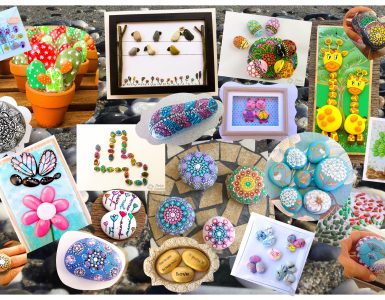

Hi. Are there any food safe varnish?
Can I use any of these on partially painted concrete coasters or concrete salad bowls?
I’ve been looking for months. I read somewhere that all varnish are safe when fully dried but I’m not sure.
Thank you
Hi Mon, some varnish are not food safe.
You can choose some type of varnish not toxic, but I advise you don’t use varnish for plates and other things to eat and drink to prevent problems. I hope my tips are usefull to you. Thanks for your comments.
Thx I’ve Seen Lots Of Vanishes, However My Query Is I Have Cleaned The Surface Of Stones Which Were Built On The Wall Of The House, Which Type Can I Basically Apply On Them So That I Keep Them Shining? And Whc Material Cud I Use To Apply I Thout Ov Abrush Or Sponge. Besides That I Also Thought Ov Using Clear Vanish. Plz Help Me #sam
We have not tested the varnish for large dimensions like a wall, but I would choose a special type of varnish for it. There are special varnishes to apply on walls, both indoors and outdoors. These types of varnish create a surface that protects the stones from the dirt of the environment, from the water, from the UV rays and lengthens the conservation in the erosion or worn surfaces. There are colored, matte, satin or glossy. Based on water or solvent.
It is applied with brush, gun or roller, with the surface very clean and dry. You must give two layers waiting for the drying time between them around 2 hours.
I hope we helped you in your question.
Best regards..
Hi
Im Planning to have a stone painted class.
the idea is to have the painted stone added to the garden. however, all the craft store are out of acrylics outdoor paints.
so. im planning to use regular acrylics and a good vanish
do you have any suggestions on how to make the painted stones durable?
Hi Lizzet, yes, you could read the following post to know the best vanish for you:
https://piedracreativa.com/blog/barniz-para-piedras-pintadas/
Best regards.